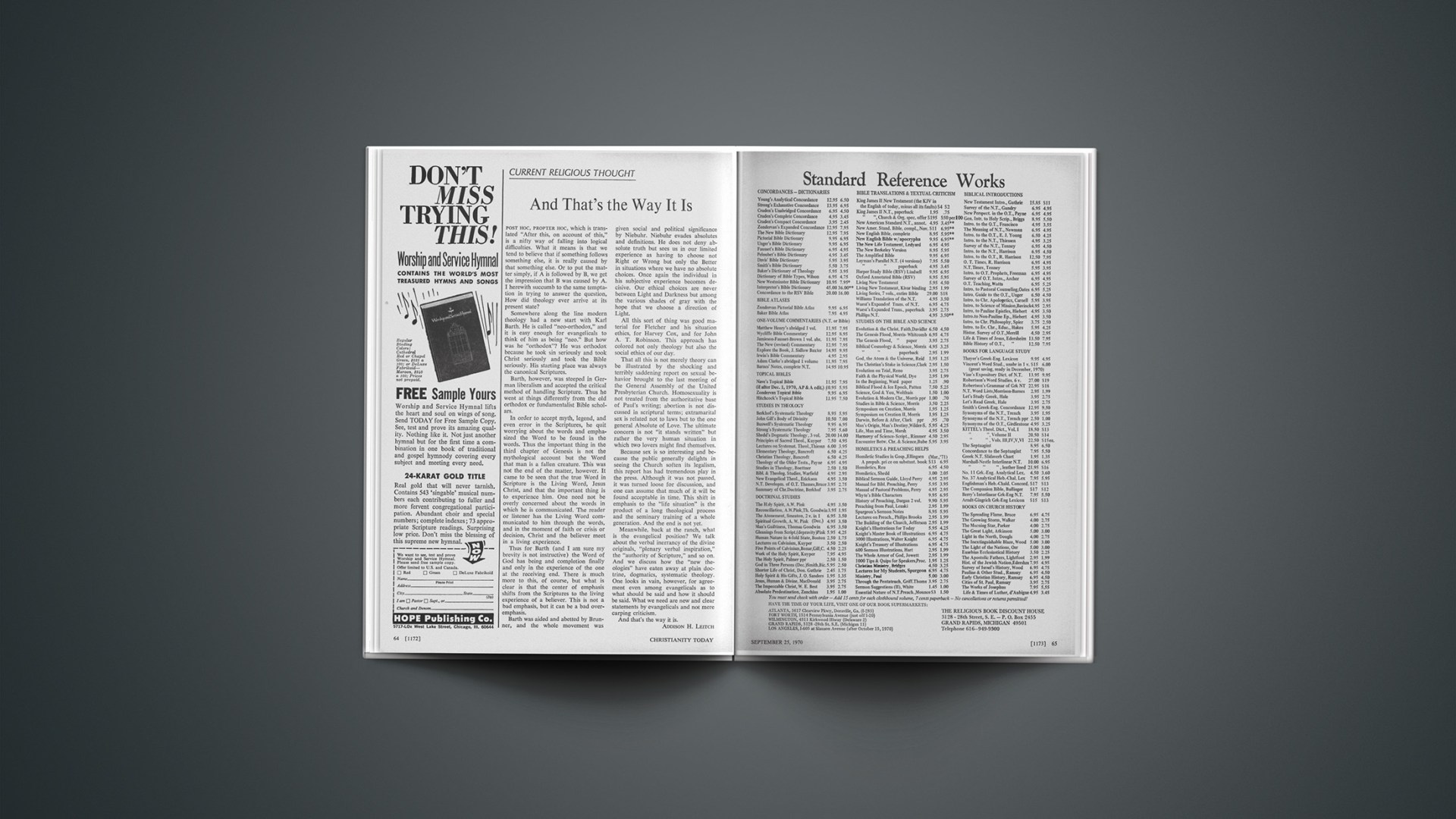Post hoc, propter hoc, which is translated “After this, on account of this,” is a nifty way of falling into logical difficulties. What it means is that we tend to believe that if something follows something else, it is really caused by that something else. Or to put the matter simply, if A is followed by B, we get the impression that B was caused by A. I herewith succumb to the same temptation in trying to answer the question, How did theology ever arrive at its present state?
Somewhere along the line modern theology had a new start with Karl Barth. He is called “neo-orthodox,” and it is easy enough for evangelicals to think of him as being “neo.” But how was he “orthodox”? He was orthodox because he took sin seriously and took Christ seriously and took the Bible seriously. His starting place was always the canonical Scriptures.
Barth, however, was steeped in German liberalism and accepted the critical method of handling Scripture. Thus he went at things differently from the old orthodox or fundamentalist Bible scholars.
In order to accept myth, legend, and even error in the Scriptures, he quit worrying about the words and emphasized the Word to be found in the words. Thus the important thing in the third chapter of Genesis is not the mythological account but the Word that man is a fallen creature. This was not the end of the matter, however. It came to be seen that the true Word in Scripture is the Living Word, Jesus Christ, and that the important thing is to experience him. One need not be overly concerned about the words in which he is communicated. The reader or listener has the Living Word communicated to him through the words, and in the moment of faith or crisis or decision, Christ and the believer meet in a living experience.
Thus for Barth (and I am sure my brevity is not instructive) the Word of God has being and completion finally and only in the experience of the one at the receiving end. There is much more to this, of course, but what is clear is that the center of emphasis shifts from the Scriptures to the living experience of a believer. This is not a bad emphasis, but it can be a bad overemphasis.
Barth was aided and abetted by Brunner, and the whole movement was given social and political significance by Niebuhr. Niebuhr evades absolutes and definitions. He does not deny absolute truth but sees us in our limited experience as having to choose not Right or Wrong but only the Better in situations where we have no absolute choices. Once again the individual in his subjective experience becomes decisive. Our ethical choices are never between Light and Darkness but among the various shades of gray with the hope that we choose a direction of Light.
All this sort of thing was good material for Fletcher and his situation ethics, for Harvey Cox, and for John A. T. Robinson. This approach has colored not only theology but also the social ethics of our day.
That all this is not merely theory can be illustrated by the shocking and terribly saddening report on sexual behavior brought to the last meeting of the General Assembly of the United Presbyterian Church. Homosexuality is not treated from the authoritative base of Paul’s writing; abortion is not discussed in scriptural terms; extramarital sex is related not to laws but to the one general Absolute of Love. The ultimate concern is not “it stands written” but rather the very human situation in which two lovers might find themselves.
Because sex is so interesting and because the public generally delights in seeing the Church soften its legalism, this report has had tremendous play in the press. Although it was not passed, it was turned loose for discussion, and one can assume that much of it will be found acceptable in time. This shift in emphasis to the “life situation” is the product of a long theological process and the seminary training of a whole generation. And the end is not yet.
Meanwhile, back at the ranch, what is the evangelical position? We talk about the verbal inerrancy of the divine originals, “plenary verbal inspiration,” the “authority of Scripture,” and so on. And we discuss how the “new theologies” have eaten away at plain doctrine, dogmatics, systematic theology. One looks in vain, however, for agreement even among evangelicals as to what should be said and how it should be said. What we need are new and clear statements by evangelicals and not mere carping criticism.
And that’s the way it is.
ADDISON H. LEITCH










